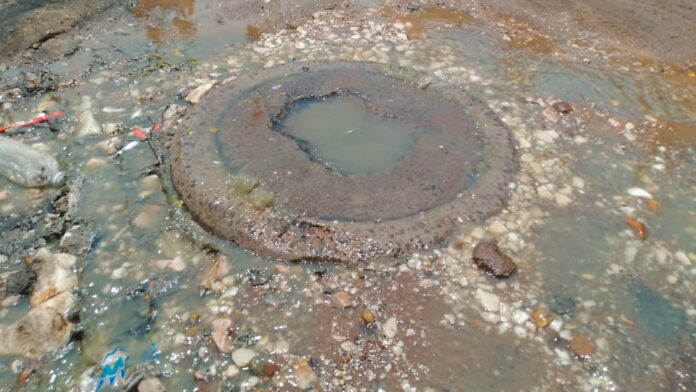By Gibson Zulu
Although those close to the US$355 million Millennium Challenge Corporation–funded project maintain that it was fully implemented and passed fit, the reality on the ground tells a different story. Persistent sewer blockages and recurring spills have left Mtendere residents trapped in a cycle of neglect — one that continues to threaten both their health and their dignity.
The crisis on the ground
On the fringes of Lusaka’s densely populated Mtendere East township, in Kalikiliki Ward 35, residents and traders cautiously pick their way through pools of murky water leaking from broken sewer lines. Raw effluent has for years seeped across the narrow footpaths that snake between homes and market stalls, forcing families to live and trade in the shadow of a persistent health hazard.

“The stench hangs heavy in the air, we have lived like this for too long,” lamented resident Chisala Laaske, his voice weary but firm. “The situation worsens when the rains come. The sewer overflows into our houses, children fall sick, and no one seems to care, not even the government.”
Mtendere East, located on the eastern edge of Lusaka, is a peri-urban community grappling with chronic water shortages, poor housing infrastructure and a collapsing sewerage system.
Ironically, Mtendere means “peace” in the local Cinyanja language — yet for those living amid sewage and repeated flooding, peace remains elusive.
What was promised
To address deep-rooted water and sanitation challenges, the Zambian Government partnered with the United States through the Millennium Challenge Corporation (MCC). The resulting Lusaka Water Supply, Sanitation and Drainage (LWSSD) Project was expected to transform communities like Mtendere.
The “Water Supply and Sanitation Project,” known as Contract Package 3 (CP3), covered works in both Mtendere West and Mtendere East. It was part of the US$355 million Millennium Challenge Compact signed in 2012.
To implement the compact, the Government established Millennium Challenge Account–Zambia (MCA-Zambia). After the compact expired in November 2018, a transition entity, Millennium Project Completion Agency–Zambia (MPCA-Zambia), was created to finalise remaining works.
The Mtendere component was only completed in 2023, and the post-compact programme officially closed in 2024.
What was built
According to MCA-II, which shared clarifications based on institutional memory from the first compact:
- The Mtendere sub-project was valued at US$40 million.
- Elevolution Engenharia, a Portuguese firm, was contracted in 2016 but terminated in 2018.
- UNIK Construction was engaged to complete the works.
Infrastructure upgrades included:
- 88 km of water supply pipelines
- 82 km of sewer network (Mtendere East alone received 42.6 km)
- 1,075 manholes constructed across the area
- Section 11: A 1.5 km sewer interceptor line with 25 manholes routing sewage to the Salama Pump Station.
Under the compact framework, all completed assets were eventually handed over to the Lusaka Water Supply and Sanitation Company (LWSC) for operation and maintenance.
The reality residents still face
Despite the infrastructure investments, Mtendere continues to experience recurring sewer blockages, overflows and contamination nearly a decade later.
A MakanDay check found persistent water and sewerage challenges along J. Muko Roadand NRDC Road.
Kalikiliki Ward Councilor Shadreck Chimwanga said the problem has been ongoing for more than four years.
“We have had enough of this problem, engineers at Lusaka Water, must take proactive measures to find a lasting solution,” he said.
Why the system is failing
Lusaka Water attributes the recurring failures to a combination of structural and behavioural challenges — including illegal structures built directly over sewer lines, blocked access to manholes, vandalised or missing manhole covers, and sewer lines laid under road centrelines, which makes them highly vulnerable during roadworks.
“Given that many manholes sit on the road centreline, the likelihood of manholes being ripped, exposed, or damaged is extremely high, even under well-planned and properly supervised road maintenance operations,” said Pamela Kasese Bwalya, Chief Executive Officer (CEO) of Millennium Challenge Account–Zambia II. “These disturbances often result in debris entering the sewer network, leading to blockages and choking of the system.’’
Behavioural factors also play a major role. These include residents dumping solid waste into toilets, using inactive sewer connections to flush stormwater into the system, and domestic waste entering manholes due to vandalism.
Bwalya, who also served as CEO of the completion agency and oversaw the finalisation of works after the MCC Compact closed in 2018, clarified that there are no ongoing or planned remedial works supported by MCC or MCA-Zambia. The Compact programme concluded with a full handover of all assets to Lusaka Water and Sewerage Company (LWSC), which is now responsible for operation and maintenance.
She clarified that there are no ongoing or planned remedial works supported by MCC or MCA-Zambia, since all assets were handed over to LWSC at compact closure. However, LWSC has introduced several measures:
- Routine sewer maintenance and jetting
- Rapid response teams addressing spillages within 24 hours
- Community sensitisation campaigns with Lusaka City Council
- Manhole security improvements
- Targeted rehabilitation of high-risk sewer lines
- Coordination with LCC contractors to minimise damage during roadworks.
Lusaka Water Public Relations Officer Ruth Mulenga added that illegal construction of houses and shops over sewer lines has worsened blockages and severely limited access for repair teams.
Fear as the rains approach
With the rainy season approaching, residents brace for worsening conditions.
“For us, the rains don’t bring relief, they bring fear,” said resident Angela Mande. “People must learn to use toilets properly, yes. But authorities also need to fix this once and for all.”
For now, the community remains caught between failing infrastructure, poor planning, and institutional gaps — with no peace in sight.
Gibson is an intern at MakanDay under the Free Press Initiative’s Journalism Graduate Internship Programme, which aims to promote excellence in journalism.

Discover more from MAKANDAY
Subscribe to get the latest posts sent to your email.



